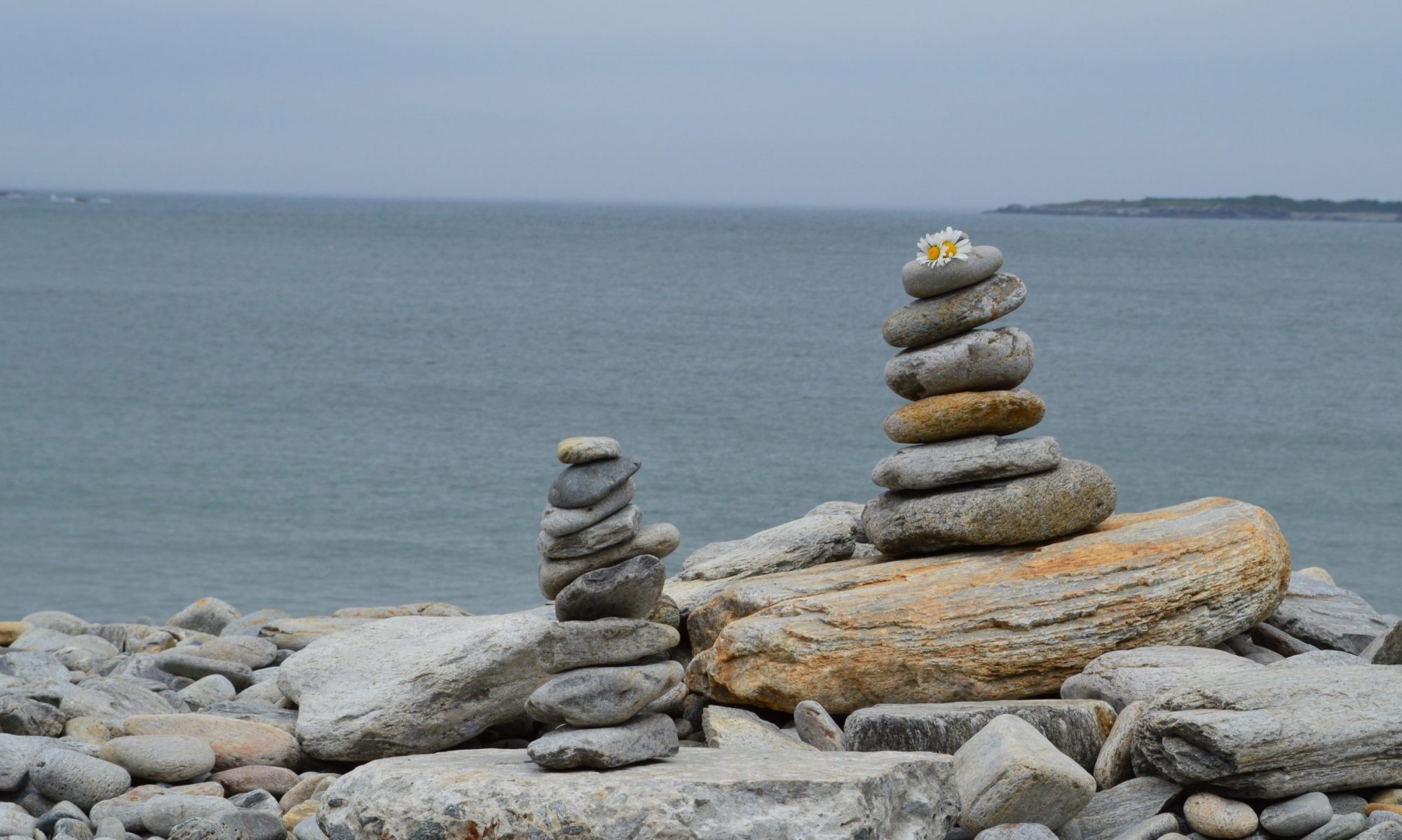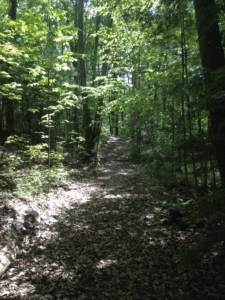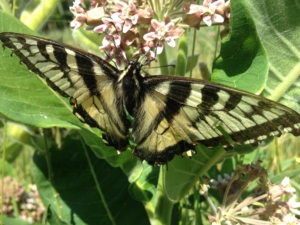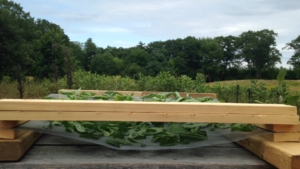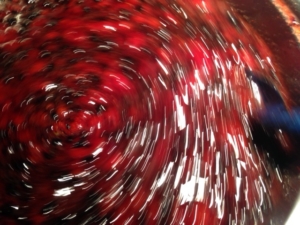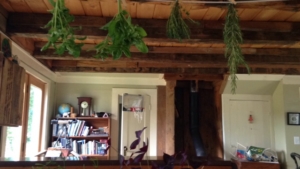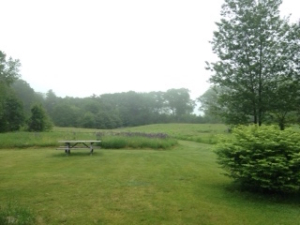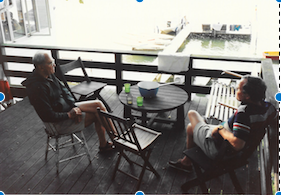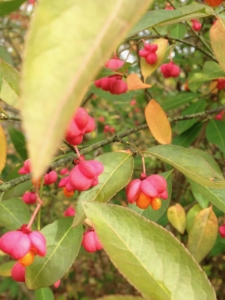 A year ago this week, I sat with my Dad while the hospice chaplain read the Sacrament of the Sick. We had no idea how he would respond to the blessing, or if he would even understand it or be able to attend to it. In fact, he sank right into it. He embraced the potential in the offering so fully that it seemed he heard the permission to notice that his life well-lived was coming to a close and that he was, happily, on death’s doorstep. I described the day at length in A Moment of Grace.
A year ago this week, I sat with my Dad while the hospice chaplain read the Sacrament of the Sick. We had no idea how he would respond to the blessing, or if he would even understand it or be able to attend to it. In fact, he sank right into it. He embraced the potential in the offering so fully that it seemed he heard the permission to notice that his life well-lived was coming to a close and that he was, happily, on death’s doorstep. I described the day at length in A Moment of Grace.
What I couldn’t have known at the time was that that blessing was the beginning of his dying process. Over the next few weeks he moved in and out of lucidity. A few days later, on Thanksgiving, Thomas and I joined him for lunch. As I slowly fed him his pureed turkey with gravy and mashed potatoes, we talked little but laughed readily, enjoying each other’s presence. Every once in awhile, he would lift his head up higher and look all the way across the table. Each time he raised his head high enough to see Thomas sitting across the table, his eyes would open wide with surprise and delight, causing us all to giggle anew at the pleasure of being together.
After lunch, we called my brother’s family. Dad did not want to talk – or listen. He had had all the company he could manage and was growing tired and uncomfortable. He became frustrated with me and, as he became emotionally agitated, he grew more physically uncomfortable. To this day, I feel bad for holding the phone to his ear so he could hear their voices until he pushed it away with anger. I knew how important it was to them to talk to Dad but I had not known his limit of comfort or capacity until we crossed it. When I apologized, he angrily lashed out, “You don’t know. You don’t know what it’s like.” He was shaking with frustration, pain, and sorrow. I could only hug him and agree. I did not know what it was like. But I was doing the best I could in this unfamiliar circumstance, just like he was. That was all either of us could do.
I still do not know what it was like. I could not walk in his shoes. I could only walk beside. As Thanksgiving approaches and I begin to count my blessings, I count the love, learning, and lessons of the caring relationship during Dad’s dementia and death among them. It opened a door for my living in each present moment with greater intention and awareness. I am grateful for the health and openings that continue to grace my days among family, friends, and the opportunities we find to continue to grow and serve.
 I had spent the weeks between Thanksgiving and Christmas last year almost fully in attendance with Dad. He declined quickly and I was visiting daily. At his bedside, I sometimes chattered aimlessly and nervously and I sometimes sat in quiet stillness. I took long walks at the beach, willing the open air and vast ocean into the consciousness of the room where he lay medicated and drifting in and out of awareness. When I was home, I wandered around in the dark and quiet. I meditated, visualized his transcendence, and slept with a rock from the beach on my chest as a gentle reminder to my spirit to remain with my earthly body when Dad walked away from his. Before he died, all of my brothers arrived and we spent several days by his bedside. We said good-bye many times before Dad took his last breath, but by the time I said my last good-bye, I knew it was really the last one I would to speak. My heart finally let go as the words left my lips.
I had spent the weeks between Thanksgiving and Christmas last year almost fully in attendance with Dad. He declined quickly and I was visiting daily. At his bedside, I sometimes chattered aimlessly and nervously and I sometimes sat in quiet stillness. I took long walks at the beach, willing the open air and vast ocean into the consciousness of the room where he lay medicated and drifting in and out of awareness. When I was home, I wandered around in the dark and quiet. I meditated, visualized his transcendence, and slept with a rock from the beach on my chest as a gentle reminder to my spirit to remain with my earthly body when Dad walked away from his. Before he died, all of my brothers arrived and we spent several days by his bedside. We said good-bye many times before Dad took his last breath, but by the time I said my last good-bye, I knew it was really the last one I would to speak. My heart finally let go as the words left my lips.
This year, in that same window between Thanksgiving and Christmas, I will be co-facilitating a 2-day Holidays with HeART workshop at Inn Along the Way. The workshops are an opportunity for people to gather for conversation and creative expression and to honor loved ones, ourselves and each other. I conceived of and proposed the workshops before I had consciously noticed the upcoming anniversary of Dad’s death and how many raw memories this holiday season would hold for me. When I became aware of the timing, I panicked. “Oh no, I’m not really ready to do this yet…” But the panic subsided almost as quickly as it came. Of course, I am ready. I am here to simply walk beside. I imagine the workshop actually originated from that readiness and my desire to create safe spaces for sharing stories of dying, loving, and deep living. We have so much to share and learn from one another. Holidays with HeART will invite laughter, tears, creativity, remembrance, and gratitude to this holiday season. For this, too, I am grateful.
